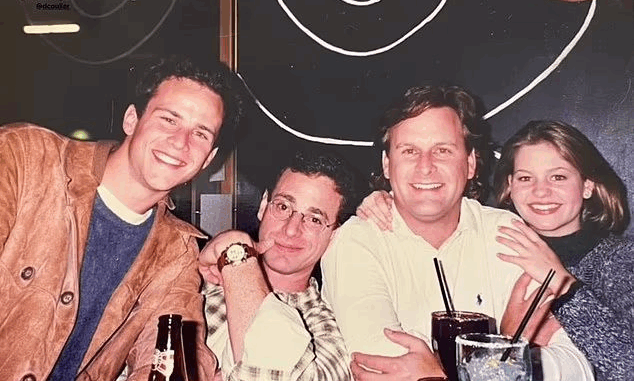
When TV Nostalgia Gets Weird — A Blast From the Past with an Uncomfortable Twist
Let’s talk about something that might ruin your innocent memories of Full House. We all loved it — the wholesome family sitcom that gave us hugs, life lessons, and, of course, Uncle Jesse. But what if behind those heartwarming scenes, child stars were fielding questions that were, frankly, kind of gross?
Well, that’s exactly what some of the now-grown-up cast members recently revealed.
The Cringe Heard Around the Set — What Actually Happened?
During a recent interview, former Full House child actors recalled being constantly asked a deeply uncomfortable question:
“Did you have a crush on John Stamos?”
Yep, people really asked that — to kids. Not once, but repeatedly. The cast members didn’t name names, but the implication was clear: it wasn’t just fans, but also media professionals who should’ve known better.
Who Were the Child Stars Speaking Out?
The comments came from Candace Cameron Bure, Jodie Sweetin, and Andrea Barber, the iconic trio who played D.J., Stephanie, and Kimmy Gibbler. All of them started working on the show at a very young age. So, being asked about romantic feelings toward a grown man was definitely unsettling — and inappropriate.
Why John Stamos?
Let’s be real. John Stamos as Uncle Jesse was the epitome of cool in the late ’80s and early ’90s — leather jackets, Elvis hair, and that rock star vibe. Adults crushed on him. Teens swooned. But to ask a kid if they had a crush? That crosses a line.
Childhood Stars and the Pressure of Fame
Being a child star has always come with its baggage. You’re expected to perform, behave like an adult, and answer questions that no child should have to. The ‘Full House’ stars have spoken about this pressure before, but this particular revelation adds another layer of ick.
What’s So Wrong With That Question?
On the surface, it might seem harmless. But let’s break it down:
-
It sexualizes children.
-
It puts them in uncomfortable spots.
-
It makes them question what’s “normal” when interacting with adults.
The bottom line? It’s just not okay.
How the Stars Responded to the Awkward Moments
Instead of brushing it off, the former cast members now use their platforms to talk openly about what they experienced. Jodie Sweetin mentioned that they didn’t even know how to respond at the time — because they were kids. It wasn’t until adulthood that they realized how inappropriate those questions really were.
Candace Cameron Bure’s Take
Candace shared that while she understood the fandom around John Stamos, it was always bizarre to be asked if she was into him as a kid. “He was like an older brother,” she said. “Asking that was just… gross.”
The Problem With Normalizing “Innocent” Crush Talk
We often normalize these questions as playful, but what we really do is blur boundaries. Child actors aren’t little adults. They’re not there for adult amusement or innuendo. When we ask leading questions like that, we’re projecting adult ideas onto children — which is never okay.
John Stamos’ Role in All This
To be clear, none of the cast members blamed Stamos himself. In fact, they describe him as kind, respectful, and a protective figure. The discomfort came from outsiders — fans, press, and talk show hosts who thought they were being funny.
How He Handled Fame and Fan Culture
John Stamos was a teen idol, and he knew it. But he’s also spoken about how fame can feel intrusive, even as an adult. So it’s not hard to imagine how much worse it would be for a kid in the spotlight.
Reflecting on the Culture of the ’80s and ’90s
If this happened today, people would be furious — and rightfully so. But back in the late 20th century, media ethics weren’t what they are now. There were fewer boundaries, and child stars were often treated as miniature adults, expected to “play along.”
How Media Has Changed Since Then
We’re now more aware (thankfully) of the need to protect child actors from this kind of attention. There are guidelines in place, and parents are more vocal. But stories like these remind us that we’ve still got a long way to go.
Lessons Learned and Moving Forward
What can we learn from this? First, we need to respect child actors as just that — children. Second, as consumers of media, we have a responsibility to challenge inappropriate content or behavior when we see it.
Protecting the Next Generation of Stars
Today’s young stars still face intense pressure, but hopefully, they have more tools — and support — to navigate it. Still, it’s on us to create a culture where they feel safe, respected, and heard.
Nostalgia, But With a Side of Awareness
We all love Full House for its sweet, wholesome charm. But being nostalgic doesn’t mean ignoring the problematic stuff. It means appreciating what was good — while also acknowledging what needs to change.
Why This Story Matters Today
So, why are we even talking about this decades later? Because stories like this shed light on the subtle ways society fails young people in entertainment. If we’re going to celebrate childhood stardom, we need to do it responsibly.
Final Thoughts on the ‘Gross Question’
No child should be asked if they have a crush on an adult — celebrity or not. It’s invasive. It’s weird. And it’s a reflection of a bigger issue within the media and entertainment industry.
